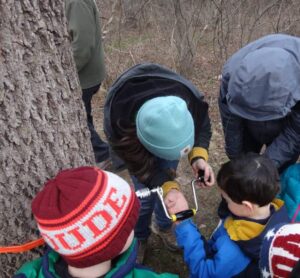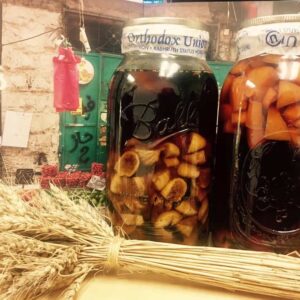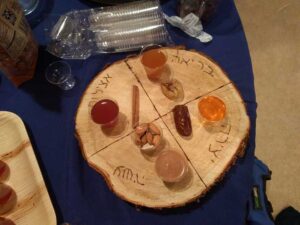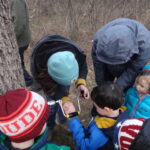by Shani Mink, Pearlstone Center – Reisterstown, MD
Blessings, on Blessings, on Blessings: Faith and Wonderment in Beshalach and Tu B’shvat
In the parsha of Beshalach we have finally emerged from the darkness of egypt and we are now headed into a different sort of darkness, the darkness of the unknown. Trapped between Pharoah’s army and the Red Sea, the Nation of Israel turns to their leader Moshe and say “Why did you take us out here to die? It would be better to serve the Egyptians than to die out here in the wilderness.” After generations, our ancestors had grown too comfortable with the abuse and degradation of slavery and from this comfort emerged a paralyzing and complacent stagnation. Though their lives in Egypt were dark and full of terrors, it was a familiar plight, a plight in which they knew what to expect. The injustices that pepper our society are just as familiar and the darkness of the unknown just as terrifying. In light of recent political transitions, the plight of dis-empowered groups previously suffering in silence have been brought to the fore. Caught between Pharoah’s army and the Red Sea, we must chose to move forward; it’s now or never.
The journey towards justice is not one to embark on alone. It is said that when we left Egypt, for every one Israelite, five egyptians joined in the exodus. Moshe did not reject these people, he embraced them on the journey towards freedom. They became part of our nation because it was not the pureness of blood that mattered but, rather, the pureness of heart and intention. When you introduce a new group of chickens to an existing flock, they will remain separate and continue to only look out for their own. Following an attack – imagine a hawk swooping down or a weaselly weasel weaseling his way into the coop at night – the two groups synthesize becoming one mega-flock. This is what happened in Egypt and this is what is happening in America right now. The Jews were not the only ones who had it bad in Egypt and we certainly weren’t the only ones who had it bad during the holocaust; in light of this shared plight with members of other nations we find ourselves in an embrace of humanity. This unity is powerful; we saw it at the Women’s Marches all over the world, we saw it at the protests at airports all over the country and we will continue to see it as the agendas of the new administration unfolds. We are all members of one human family fighting for liberty and justice for all and it has been inspirational to see Americans waking up to this beautiful reality.
At the edge of Red Sea, Hashem told Moshe to raise his staff to split the sea so the Israelites might cross on dry ground. Moshe raised his staff and nothing happened. It wasn’t until Nachshon from the tribe of Yehudah was up to his eyeballs in the sea that the waters finally split. When the water was up to his knees he did not turn back. When the water was soaking his chest he did not turn back. And when the water was kissing his chin, Nachshon did not turn back. Despite any obvious evidence that a clear path would appear in front of him, Nachshon walked with full Emunah, full faith into the Red Sea. Without Nachshon, the sea might not have split and without people willing to put themselves on the line and jump in, no new paths towards freedom and justice will emerge. We all need to be like Nachshon, jumping, walking or marching forward into what seems an endless ocean for the sake of what we believe.
Once they passed through the Red Sea and saw their enemies thoroughly demolished in its waters, the nation of Israel sang. Because of their songs, this Shabbat is often called Shabbat Shira or “The Shabbat of Songs.” Some say that there is special prayer power in song on the Shabbat of Beshalach and though the Israelites were singing in joyous praise, some of us might find ourselves singing in pleading praise. Tap into this sacred energy and find a way to connect through song.
In addition to being Shabbat Shira, this Shabbat is also the sacred and mystical holiday of Tu B’Shvat. Often called the New Year for the Trees or the Birthday of the Trees, Tu B’Shvat invites us to tap into the energy of the freshly flowing sap in the veins of our rooted brethren and renew the world with blessings and connection. In Jerusalem, you can walk to Gan Sacher and see and smell the fresh almond blossoms but here, in the enduring cold of Maryland, the flow of life within the trees is not as obvious. Luckily, Pearlstone’s beautiful 160-acre campus is home to an abundance of maple (and black walnut) trees whose sap is flowing this time of year. This past weekend we hosted a Tu B’shvat themed “Family Farm Day” where we welcomed almost 50 families to experience maple-tree tapping and taste-test different types of syrup on delicious pancakes. This blog is called D’Varim HaMakom (meaning roughly “Words of the Place”) and it encourages us as JOFEE fellows to really tap into the Torah that the land we are on has to teach us. This Tu B’shvat, this lesson is really coming alive for me as I connect the hidden life within the trees and though maple syrup is not technically a fruit, I am moved to say Boreh Pri Ha’Etz when I eat it because syrup is the sweetness that these trees have to offer.

Fellow JOFEE educator Mira Menyuk helps Family Farm Day participants tap a Black Walnut Tree
During their desert wanderings, Hashem provided the Nation of Israel with Manna as a source of subsistence. Each day, they collected just what they needed and nothing more; they did so with the faith that enough would appear again the next day. This exercise in abundance allowed the Israelites to reconnect to the source of life; rather than seeing their food as provided by the hand of an Egyptian or even through the toil of labor, they were given the opportunity to remember that food comes directly by the hand of the creator. The awe and wonderment that such a direct and nurturing experience with the divine must have inspired is the same awe and wonderment we should all strive to embody when we eat. How beautiful, how amazing, and how holy that fruit simply grows from the limbs of trees! In his book “God in Search of Man,” Rabbi Abraham Joshua Heschel writes that as Jews, “We are trained in maintaining our sense of wonder by uttering a prayer before the enjoyment of food. Each time we are about to drink a glass of water, we remind ourselves of the eternal mystery of creation.” Each time our wonderment manifests as a blessing over our food, we are inviting the divine into our daily experience.
In his book, “Seasons of Our Joy” Arthur Waskow writes that fruit is “the symbol of the awesome moment in which the flow of life is renewed; and if human beings eat it in a holy way, with the proper blessing and directed intention, the flow is maintained and encouraged” (107). Therefore, on Tu Bishvat we’re encouraged to say as many blessings as possible in order tap into this sacred energy and keep the flow going. In addition to our Family Farm Day, Pearlstone is Celebrating the New Year for the Trees with a mystical Tu B’Shvat Seder. In order to honor the holy fruits of the land of Israel, we made cordials with dates, figs, and almonds.

Date and Fig Cordials in process for the Mystical Tu Bishvat Seder
May the fruit of this earth evoke wonderment, may our wonderment turn to blessings and may our blessings nourish the holy flow of creation.

“Wood-Cookie” Tu Bishvat Seder Plates with Four Cordials Representing the Four Worlds
Editor’s Note: Welcome to D’varim HaMakom: The JOFEE Fellows Blog! Most weeks throughout the year, you’ll be hearing from the JOFEE Fellows: reflections on their experiences, successful programs they’ve planned and implemented, gleanings from the field, and connections to the weekly Torah portion and what they’ve learned from their experiences with place in their host communities for the year. Views expressed are the author’s and do not necessarily represent Hazon. Be sure to check back weekly!
